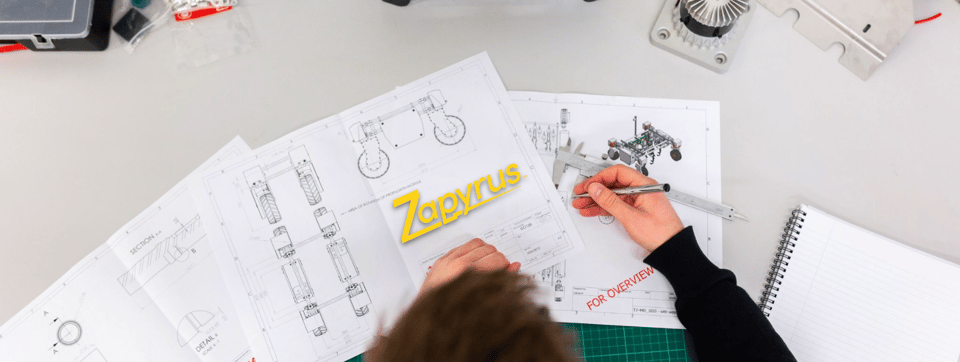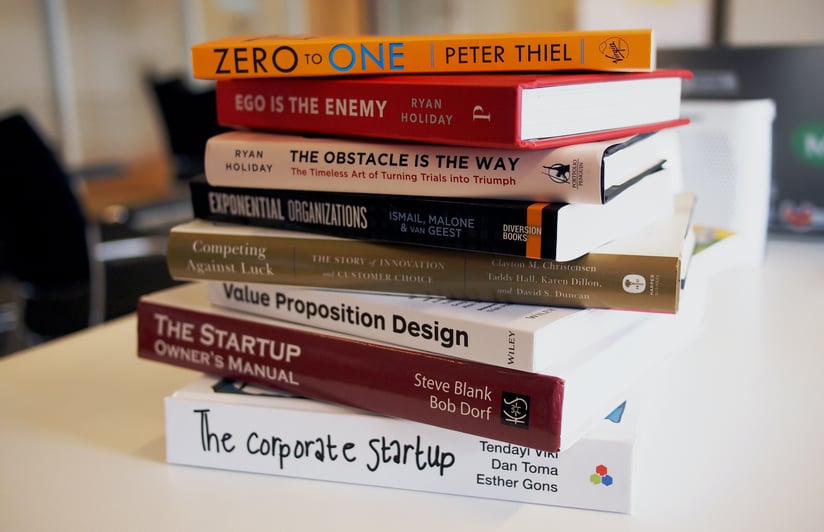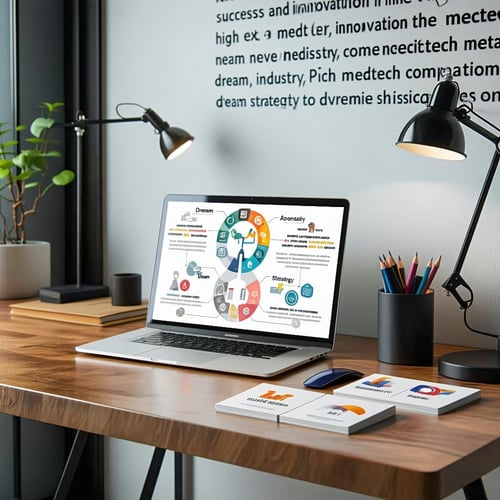Win the Business: What Engineers Don't Know About Selling to MedTech OEMs
September 07, 2023 | Kevin Saem, Ph.D. |
MedTech Business Development

Getting Started
Engineering professionals offer a range of specialized services to MedTech Original Equipment Manufacturers (OEMs) to support various stages of product development, manufacturing, and regulatory compliance. Rather than in-house engineers, smaller OEMs, and startups generally look for these services offered by engineering firms or individual engineering consultants.
Many engineers are uniquely positioned to understand and excel at the selling process, and the ability to understand how to present a service, communicate the value, how it's different from the competition, and what business problem it solves is critical to selling engineering services to new customers and growing a business.
Understanding the connection between engineering and sales skill sets, the mindset shift from technical to relational problem solving, the frameworks for successful selling, and how industry experience gives engineers unmatched credibility as trusted advisors for OEMs will lead engineers to leverage their expertise to win more business.
Setting the Stage: Engineers' Expertise and the Challenge of Sales
Even from an entry-level position, from mechanical engineering to medical devices, engineering professionals have a valuable set of skills. At the core, engineers are problem-solvers with a career path of using creative innovation to design solutions for improving products, processes, and lives. The process of selling isn't much different. At the core, the sale of a product fills a gap or need with a solution to address a challenge or a pain--the problem.
The sales professional is a problem solver, using that same engineering mindset of creativity and innovation to provide a customer with the right product and price to solve the problem. Even given the similarities, the jump from engineering to sales takes a shift in mindset and skill sets.
Understanding the Mindset Shift
The difference between working on a project as an engineer to selling your skills as a service involves knowing when to be the technical expert and when to be the trusted advisor.

Technical expert - Technical experts have specialized knowledge in a specific field. They offer insights and solutions to complex technical problems and are highly valued for their expertise and qualifications. They are frequently called upon to provide accurate solutions and tackle technical challenges.
Trusted adviser - A trusted advisor is a good consultant who offers both technical expertise and guidance to build relationships, trust, and understanding with their clients. They consider broader aspects and help clients make informed decisions aligned with their goals and broader business objectives.
Selling your services as an engineer requires you to embody both the technical expert when carrying out your client's project, and simultaneously playing the trusted advisor as an engineering consultant. For many domains this mindset shift is challenging, it requires a different approach to problem-solving and understanding what experiences you can leverage to be effective as a consultant.
Growing Into the Trusted Advisor

Below are some sample questions that aim to highlight areas of interest and strength, and identify opportunities for growth as a trusted advisor and consulting engineer in the medical device industry:
-
- Which past medical device projects have captured my enthusiasm and interest? Can I see myself providing guidance and insights in these specific areas?
- Apart from technical skills, what non-technical skills like communication, teamwork, or project management do I excel at? How can I leverage these skills to provide comprehensive advice for clients in different phases of design and business lifecycle?
- What specific domains within engineering and the medical device field do I have a strong grasp of beyond just technical knowledge? How can I use this understanding to guide stakeholders and clients effectively?
- How comfortable am I with using layman's terms and relatable examples to convey complex engineering concepts when developing medical devices?
- Am I interested in exploring or advising on the ethical implications and regulatory requirements of medical technology development? Can I envision scenarios where I provide guidance considering these factors?
- Am I open to improving my soft skills like communication, active listening, and empathy? Can I commit to ongoing growth in these areas to become an effective advisor?
- Am I comfortable offering guidance when facing new challenges or there's no established solution? Can I provide insights even in situations with rapidly changing technology and regulations?
- To reach the greatest number of potential customers, businesses that are seeing sales success are leveraging a multi-channel approach of inbound and outbound leads for identifying potential customers.
These questions will help you communicate the unique value you bring as a consulting engineer to your prospective clients, their goals, projects, and common tasks you're specially positioned to assist with. The result may lead to identifying a particular niche in the MedTech industry you prefer to operate within, here is a non-exhaustive list of domains for engineering consultants:
- Regulatory Compliance
- Product Development and Design
- Quality Management
- Risk Management
- Verification and Validation
- Manufacturing Process Improvement
- Clinical Trials and Testing
- Human Factors Engineering
- Supply Chain Management
- Intellectual Property Protection
- Post-Market Surveillance
- Interfacing with Regulatory Agencies
- Project Management
- Due Diligence and Technical Assessments
The answers to these questions will become your value proposition, a key component in differentiating yourself from your competition. This difference will be valuable to your future clients and therefore is important to connect your value proposition to the business objectives of your prospective clients in a framework that will help you win business.
Framework for Successful Selling

MedTech Engineers utilize various frameworks daily, such as scientific principles, design control processes, laws of physics, tolerances, human factors engineering, design thinking, six sigma, scrum, and usability engineering. Well-structured frameworks properly executed lead to successful projects.
The same is true in selling, there are frameworks and different sales methodologies for establishing clear goals and metrics to facilitate a sales process and lead to won business. Think of a sale like a project, every sale has a few components that are worked out between the buying organization and the selling organization
- Product or Service Fit
- Scope of Work To Be Done
- Budgeting and Cost Control
- Project Planning & Time Management
- Quality Standards and Acceptance Criteria
- Resource Allocation
- Stakeholder Management
As they unfold, these components follow a natural order and reveal a framework for successful selling. This framework follows 5 steps and can occur in one meeting, or many meetings, depending on how you structure your customer engagement.
Discovery
This is the first step after securing a meeting with a potential client. It's the process of listening and empathizing with clients, uncovering and outlining their needs, and identifying any pain points or challenges they're experiencing. This process of discovery runs throughout the next four steps and begins with asking the right questions that reveal the business challenges your service can fulfill.
Example
- A consulting engineer with 10 years of experience meets with the CEO of a new startup developing an orthopedic implant for corrective surgery. During the initial meeting, the engineer learns the CEO doesn't have any skills with CAD software, but came up with a great idea for the implant given his experience as an orthopedic surgeon.
- The engineer learns this CEO has gotten funding from a few investors and is targeting a particular timeframe for getting the designs complete, a prototype developed, and an FDA submission underway.
- Takeaways: The engineer--having 10 years of experience--knows this expertise can be leveraged by the CEO and be seen as added credibility by the investors, and a quick turnaround time on designs for this device means supporting the outlined timeline for regulatory submission and shorter time for the investors to recoup their capital.
Demonstration
The demonstration phase shows how you plan to fulfill the needs of your prospective client. The best way to do this is to share case studies or past projects that use real-world examples to illustrate solutions that are relevant to the client's needs and turn the technical details into engaging narratives. This demonstrates your track record and practical experience.
- That same consulting engineer shows the startup CEO some past projects similar to the CEO's device, outlines the time constraints involved in those projects, and is able to offer some insight into revising the CEO's expectations on how long the prototyping phase will take. This engineer is positioned as a trusted advisor and has built the CEO's confidence that working together will help accomplish the business's objectives.
Proposal
A proposal describes the features and benefits of a service offering and addresses your prospective client's needs, concerns, and challenges. It's generally a formal document that also contains the scope of work to be accomplished, the price of the service, how the work is billed, and the terms and conditions of the business relationship.
Negotiation
The service you're offering to a prospective client should be billed at a fair rate considering what the market pays for your service, including your experience level and the time the work will take you to complete. However, people are always looking for a break, and chances are you will be asked to negotiate a discount. Nobody negotiates for something they don't want, and when someone is negotiating, they want what you have.
A negotiation should result in a win/win scenario for your and your prospective client, so don't be afraid to lose and walk away from a deal with an unreasonable prospect. The key in negotiation is: don't give away anything for free. If your buyer wants a discount, always ask for something in return--whether that's a guarantee of future business from that client, names of other referrals for future business, or something else valuable to you--before committing to any discounts.
Commit
Once the scope of work, price, terms, and conditions have been agreed upon, you have a committed deal. After an agreement is signed between both parties, that completes the successful selling framework and you have yourself a client. Once you go to work on the project, remember to stay in good communication with your client throughout every stage of the project execution.
Communicate early and often about key project milestones, and be redundant in doing so. Even though you won someone's business, you still need to constantly validate their choice in picking you by delivering quality work and a good customer experience.
Conclusion
To sell engineering services, consulting engineers need to bridge the gap between technical expertise and sales skills, along with understanding how to present and communicate their services' value to solve real business problems.
Being a trusted advisor starts with the very first engagement. If your messaging seems generic, then that trust is not formed due to the abundance of mass marketing emails floating around their inboxes every day. Building trust from the beginning takes a lot of research time into each prospective client before attempting an outreach. Although effective in building trust, the amount of hours spent on manual research does not make this process scalable within a lean sales team.
Zapyrus machine learning helps stay up to date on key event triggers, allowing you to craft the perfect outreach message quickly while at the same time enabling you to reach a larger amount of potential clients.
To learn more about how you can increase your outbound efficiency while building meaningful relationships as a trusted advisor, check out www.zapyrus.com for a free product demo.
________________________________________________________________________
Are you considering investing in a sales intelligence platform?
Let us show you how Zapyrus can help you create meaningful outreach without digging through NIH abstracts, clinical trials databases, device approval databases or endless google searches.






